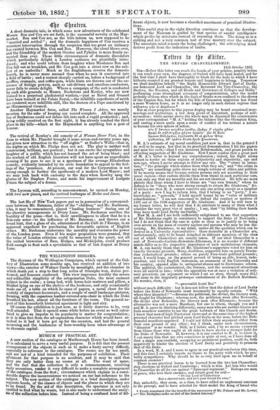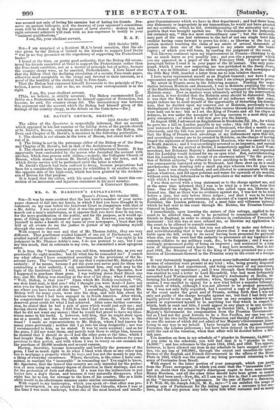Irtttro tu thr fititur.
THE OXFORD CHANCELLORSHIP.
11th October 1852.
Sm—Before this letter can reach the hands of your printer, possibly before it can reach your own, the disgrace of Oxford will have been sealed, and for the first time I shall have thoroughly to blush for the body to which I have hitherto counted it my greatest honour and happiness to belong. Tomorrow we shall doubtless behold " the Right Honourable Edward Earl of Derby, our honoured Lord and Chancellor, the Reverend the Vice-Chancellor, the Doctors, the Proctors, and all Heads and Governors of Colleges and Halls," performing some triumphant ceremony of congratulation, after the model probably of those rites which in the 'days of Strabo were confined to the shores of the Caspian Sea, but for which the tide of Caucasian migration has found a more Western home as it is no longer only in such distant regions that witeorTat ol &amis.* But at cross purposes to this joyous display may be heard occasional mur- murings and mutterings, a low deep growl of discontent, perhaps of self- accusation ; while serene above the whole may be discerned the countenance of your correspondent "M. A." holding the balance like the Olympian King, and casting a stern smile upon a scene of conflict of too terrene a nature to become his own sphere of action. d' iirtcrov paratp bladed' POxa d' adpela x04w. 401 crtiXirLyEiv piyas 4pavos, Ea di Zak
fi,LEvos
-06V/117ft iyiXaree a OiXov rgoodvp, 56' . -h•rop 9•Eolv fps& Euvarrev.
M. A.'s estimate of my moral condition just now is, that in the general I do well to be angry, but that in its practical demonstration I hit the pigeon and miss the crow,—that I vex innocent Hebdomadals, and grant pardon to offending supporters of Mr. Gladstone. Now I must confess that a great part of hi. A.'s letter is beyond my comprehension ; indeed, his flight seems almost to border on those regions of subjectivity and objectivity, ego and non-ego, where I never attempt to follow any one. The "crime in inten- tion," "the principle which makes them what they are," and "the crime in result," are something quite above my simple notions of ethics and politics. If he merely means that because certain persons only act according to their usual custom—that custom shields them from blame in each particular case, I can only say that my morality and his are not identical. He tells me more plainly that those whom I have to blame are "my own Mends," whom he defines to be "those who were strong enough to return Mr. Gladstone," &c. It'strikes me that M. A. cannot conceive any one acting except as a member of a party : now I beg to inform him, that I belong to no "party," lee- knowledge no "generals," I hold myself bound by no "rules of military subordination." I am not concerned to defend the conduct or motives of 1107 out of the 1108 supporters of Mr. Gladstone. And if he will turn to my former letter, he will find that I do attribute to many of them what I consider the very great vice of apathy ; I say, that "by folding their hands they have made Lord Derby inevitable." Now M. A. and I are both sufficiently enlightened to see that supporters of Mr. Gladstone ought in consistency to support the Duke of Newcastle ; but I do not think that the case is quite so clear as to justify us in being over severe on the mass of country squires and parsonswho may be less dis- cerning. Mr. Gladstone, to my mind, unites all the qualities which can be desired in a University representative : those desirable in a Chancellor are, unfortunately, only to be found detached in different members of the class out of which. Chancellors are usually taken. If our ideal Chancellor is a sort of Newcastle-Cailisle-Redesdale-Ellesmere, it is no wonder if different minds differ as to the respective importance of such multifarious elements, hi. A. can hardly think that all Mr. Gladstone's supporters voted for him on exactly the same grounds. Many, doubtless, supported him on purely Tracta- rian ecclesiastical grounds ; others on purely Free-trade political grounds ; most, I would hope, on the general ground of being an able, honest, inde- pendent, and truly English statesman, an ornament of his University and his country, opposed alike to antiquated abuses and to Doctrinaire reform. The political, the ecclesiastical, the literary, and the academical attractions were all united in him; while the opposition was at once a violation of ordi- nary precedent, (an argument on which I set no store, though many did,) and came in the singularly grotesque embodiment of Dr. Bullock Marsham. No wonder, then, if
"—procumbit humi Boa"
without much difficulty : but it does not follow that the defeat of Lord Derby before the Duke of Newcastle must necessarily be equally certain. "Why where they disunited ? "—Because the politician, the divine, the literary man, all fought for Gladstone ; whereas now, the politician went after Newcastle, the divine after Redesdale, the literary man after Ellesmere; because the alternative was not a mere Marsham, but one in whom, though you and I and M. A. agree in thinking differently, many men who are neither knaves nor fools somehow contrive to see the great bulwark of this Church and Realm. I know that men of high Traetarian views and at the same time of the highest personal character had pitched upon Lord Derby as the man, before the Heb- domadal manifesto appeared. I could not follow their argument either from their own ground or any other ; but I think, under such circumstances, "disunion" is no wonder. Still, as I before said, I by no means exonerate from blame those who ought at all risks to have shown a stronger fight for the Duke of Newcastle. If, however, it is any comfort to M. A. to know it, I can assure him that my own conscience is quite at rest, as I have done all that a single non-resident, occupying no prominent position, could do, both negatively to hinder the election of Lord Derby and positively to promote that of the Duke.
In a word, M. A. and I seem to agree in our practical conclusion this time, and this time I certainly impute no blame to the party with which he pro- bably sympathizes. Why should he be so very hard upon me in behalf of common enemies ?
There is one practical lesson to be learned from the two last Chancellor- ship elections in Oxford and Cambridge ; which is this. Let him who would be Chancellor do all he can against "Episcopal regiment." Bishops are men of peace who love their enemies, and return good for evil- " Do my Lord of Canterbury
But a shrewd turn, and he's your friend for ever."
But, unluckily, they seem, as a class, to have added an unpleasant converse to the precept, and to have selected for their model the King of Israel who
• Freely translated (for the benefit of the successors of Mr. Palmer and Mr. Lewis) —" The Derbyltes make an idol of the landed interest." was accused not only of loving his enemies but of hating his friends. Pre- serve an ancient bishopric, and the doorway of your opponent's committee- r00111 will be choked up by the pressure of lawn sleeves ; destroy ten, and right reverend admirers will rush with no less eagerness to testify to your "eminent qualifications."
13th October 1852.



























 Previous page
Previous page